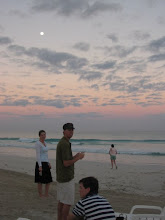While I'm working on my second revision, I'm keeping in mind how important it is to get a set of fresh ears to listen and comment on my composition. The motive I took from my second piece and placed in the first revision of my first piece (the low rumbling chords) seemed like such a brilliant idea and great way to transition sections. It sounded great and a little unexpected to me which was what i was going for. However it didn't really make sense to anyone else, and when I really thought about it it didnt make much sense to me either.
My compositions had always sounded a great deal better when they were performed than on the midi playback (which isn't a surprise). It kind of made me begin to think, if it sounds ok on the midi it will probably sound a lot better when it is performed. Not always the case.
It is for these reasons, I went to Simon and asked him if he could just play through some of the changes that I had made and experiment with some of the other ideas for changes I haven't made yet. This way i won't have to rely on the midi playback or attempt playing it , and can hear how my ideas will actually sound in the performance. I am truly thankful that simon was able to do this because it gave me a much better sense of how everything will sound.
Saturday, October 17, 2009
Tuesday, October 13, 2009
Revisions, Revisions
Last week I began to revise my first character piece. I wasn't overly worried about it, thinking that if I have my main ideas down, just touching up the little things will be a breeze because I wont really need to articulate anything new. Funny thing about that.
The revision process actually became to be much more difficult than I had origionally anticipated. I begin to pick up on little things that I want to fix, and the makeshift segues don't cut it. And that's the thing, for the first edition of this composition it was just presenting my main ideas, and I could find some little thing to connect them for the time being. With the revision, It's not about ideas, it's linking main ideas to make it flow better, which for me is the hardest part. I feel like I could come up with a million new musical ideas, but making them flow is the killer.
The revision process actually became to be much more difficult than I had origionally anticipated. I begin to pick up on little things that I want to fix, and the makeshift segues don't cut it. And that's the thing, for the first edition of this composition it was just presenting my main ideas, and I could find some little thing to connect them for the time being. With the revision, It's not about ideas, it's linking main ideas to make it flow better, which for me is the hardest part. I feel like I could come up with a million new musical ideas, but making them flow is the killer.
Friday, October 2, 2009
Character Piece 2
Last Friday I presented the second character piece, and in some ways I was disappointed and other ways I was pleased. It's funny the difference hearing a piece performed acoustically can make form hearing it on Sibelius.
Hearing this second piece on Sibelius was far from satisfying. For the main reason that there's no option to hear the piano sustained or anything like that. For this piece, the entire piano line was based on the sustain of two undulating chords. also the dynamics performed live change that dramatically.
Hearing my piece performed however, made me realize how hard it is to write for the glock. it seemed like everything just melted together and all you could hear after a while were the accumulating overtones. It was much too loud compared to the piano and overwhelming at points.
However myself and Andrew took the time to experiment with different mallets to see which would work the best. And I even think for some of the passages in this piece (where it is just the glock, I will get him to use the stick ends of the mallets, just to convey even a more serene atmosphere.
Other than that, I love this piece. although it is too marginalized, so I'm going to need to take the time to overlap certain sections where the piano and glock can play together.
Hearing this second piece on Sibelius was far from satisfying. For the main reason that there's no option to hear the piano sustained or anything like that. For this piece, the entire piano line was based on the sustain of two undulating chords. also the dynamics performed live change that dramatically.
Hearing my piece performed however, made me realize how hard it is to write for the glock. it seemed like everything just melted together and all you could hear after a while were the accumulating overtones. It was much too loud compared to the piano and overwhelming at points.
However myself and Andrew took the time to experiment with different mallets to see which would work the best. And I even think for some of the passages in this piece (where it is just the glock, I will get him to use the stick ends of the mallets, just to convey even a more serene atmosphere.
Other than that, I love this piece. although it is too marginalized, so I'm going to need to take the time to overlap certain sections where the piano and glock can play together.
Subscribe to:
Comments (Atom)
